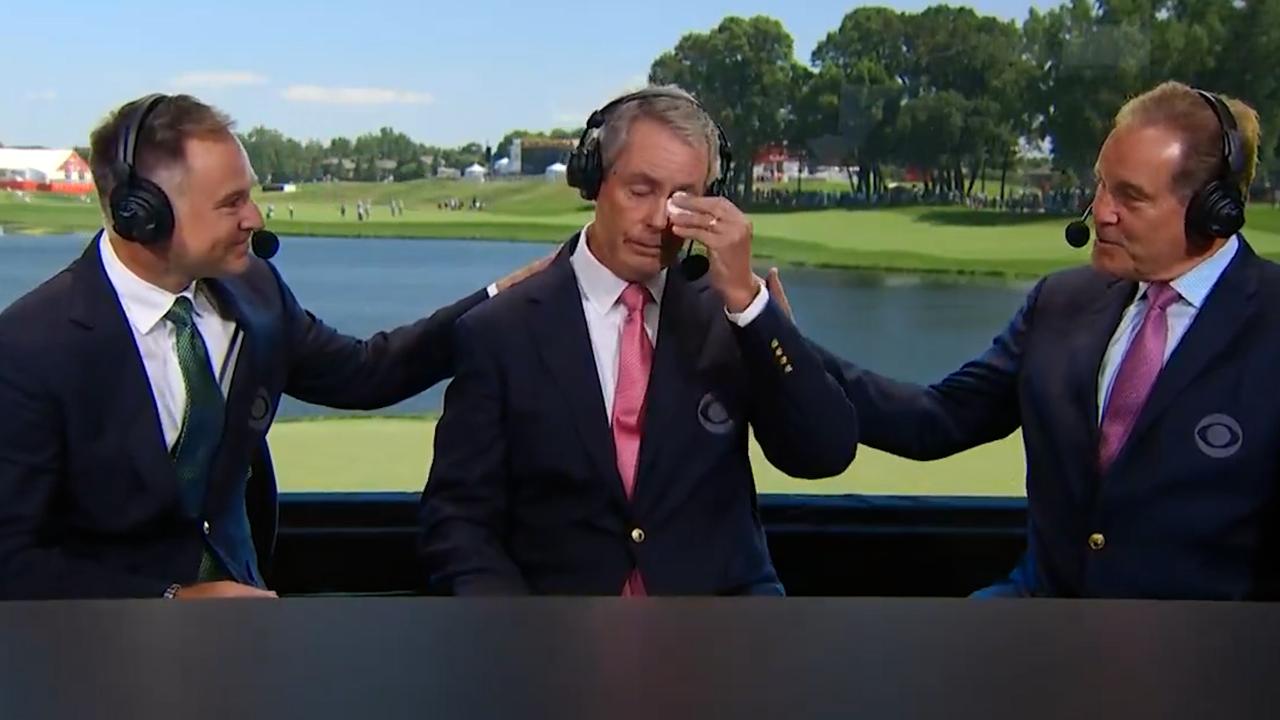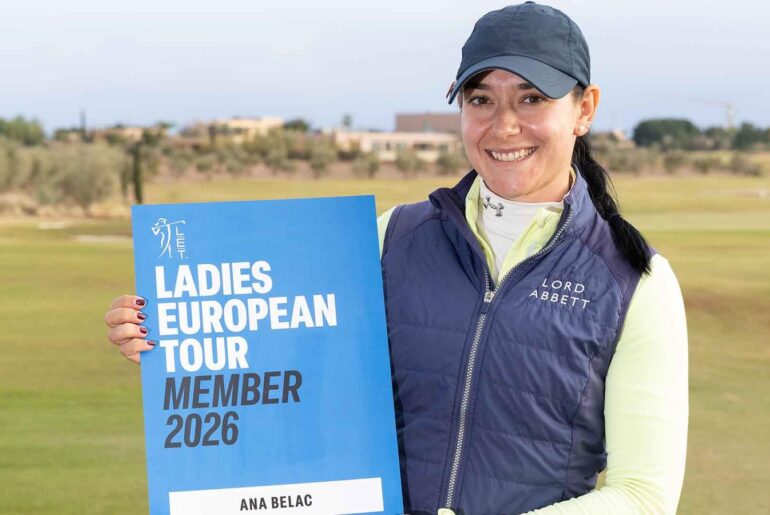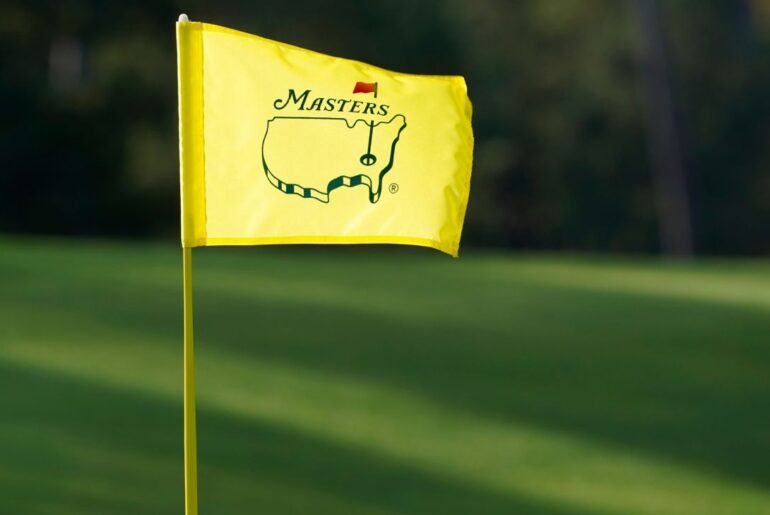“From down under to the top of the world.”
It is a famous moment in Australian broadcasting, the perfect line delivered by Ian Baker-Finch to describe the magical moment Adam Scott claimed the 2013 US Masters at Augusta.
But on a day where Baker-Finch’s exceptional career has come to an end, it is also the ideal sentence to describe the popular Australian being lauded across the world of golf.
FOX SPORTS, available on Kayo Sports, is streaming The 2025 PGA Tour LIVE & Exclusive | New to Kayo? Join now and get your first month for just $1.

From the Golden Bear Jack Nicklaus to Tiger Woods and Australian champions as well, and onto his colleagues at CBS and those who have listened on as IBF dissected what was happening, the Aussie voice who has been part of golf’s soundtrack is being celebrated.
He has come a long way from knocking the ball around the Beerwah Golf Club, a nine-hole knockabout in the Sunshine Coast hinterland his dad helped to build, as a skinny kid with a handful of clubs in the bag.
When acknowledging Baker-Finch’s retirement after the Wyndham Championship, Scott noted it was a special touch to have a fellow Aussie major winner deliver the line that encapsulated the importance of an Australian finally breaking through at Augusta.
“Congratulations IBF on a wonderful broadcasting career,” he said.
“Your love for this game was clearly expressed every weekend on the telly. To have you call my win on the 10th green at Augusta is a great memory for me. Wishing you all the best for the future, mate.”
The secret to Scott’s iconic Masters win | 02:40
In a social media posting, Woods said he would treasure the memories the Queenslander, who is 64, delivered to him during his own golden career that is now in its dotage.
“Congrats Finchy for 30 incredible years behind the microphone. You brought insight into things that the viewing audience could understand and relate to. From all of us, thanks for the memories,” Woods said.
Nicklaus, the all-time great with 18 major championships, said Baker-Finch had made a great contribution to the game after putting down the putter and picking up the microphone.
“Ian has been great for the game of golf. He was a good player with a wonderful personality and he has been a great addition to the CBS golf broadcasts. We wish him well and congratulations,” Nicklaus said.
Jason Day, another Queenslander with a major to his name, noted the personal touch of Baker-Finch that clearly made the Aussie such a popular person around golf’s great courses.
“You have always been a bright spot in our game. A champion both on and off the golf course,” he said.
“I always looked up to you and knew what you stood for – excellence and, more importantly, decency. I’ve always considered you my friend and just a great human being. Congrats on a great career (and) thanks for your friendship, Finchy.”
Australian Golfer, Ian Baker Finch. Pictured with the Claret Jug after winning the 1991 British Open, Picture: SuppliedSource: Supplied
But it is not just the great golfers celebrating Baker-Finch, who held aloft the claret jug after a famous triumph in the British Open at Royal Birkdale in 1991 and also posted two Top 10 finishes at Augusta before his game infamously deserted him.
His colleagues at CBS, where he has worked for the past 19 years, through to those who worked with him in the infancy of his broadcasting career in Australia chimed in with tributes in what proved moving scenes in the booth over the past fortnight.
Australian golf writer Mark Hayes told this reporter earlier this year during a preview piece for the Masters that IBF was one of the nation’s greatest golfing exports given his deeds on the course and in explaining the game to the world.
He noted that one of the greatest experiences of his career was being invited by Baker-Finch to sit with him as he covered the famous Golden Bell hole to complete Amen Corner.
Former broadcaster Luke Elvy, who started his career with Fox Sports Australia, described in detail on social media the doors Baker-Finch opened for him in the United States.
Dottie Pepper, a 17-time LPGA Tour winner who is now the lead reporter for CBS, said that her now-retired colleague was “class personified”.
“Finchy is a major champion. We all know that. But what everyone else might not know is that you are a major great human being,” she said in an emotional video tribute.
“You have taken care of this crew. You were a mentor. A teacher. A big brother. So many things to so many people. Gosh, we are going to miss you,” she said.
His response: “If it is any consolation, Dottie, I am crying too.”
That has been the theme for the past fortnight since Baker-Finch announced he would be bidding farewell to those he has covered, worked with and spread his love of the game to.
FROM TEE TO GREEN AND TO HELL AND BACK
Before putting his golden tonsils to work behind the microphone, Baker-Finch compiled a celebrated career that is more curious for the difficult manner with which it ended.
Having grown up in Nambour, he credits Nicklaus’s book Golf My Way for helping him craft his game as a youngster when he had a few woods and a couple of irons in his bag before setting out on the PGA Tour of Australasia.
“I had this dream of being a club pro, giving lessons and being part of the fabric of a club. I never thought I’d be an Open champion,” he told Golfweek.
A maiden triumph in the New Zealand Open in 1983 was the catalyst for Finchy shooting into broader Australian consciousness a year later in what was a headline-grabbing Open debut.
Having earned a start in the 1984 British Open played at St Andrew’s Old Course courtesy of his Kiwi triumph, the Aussie played superlative golf for the first three days.
Reaching the halfway mark at 10-under, he led giants including eventual champion Seve Ballesteros, Nick Faldo and Lee Trevino by three shots, and shared the lead with Tom Watson into the final round before disaster struck.
A final round 79 saw him slide to a share for ninth at 4-under, eight shots behind the Spanish star and a couple of shots shy of being the best Aussie, an honour taken by Greg Norman.
Not surprisingly, the final round blow up features among the tales in his autobiography To Hell and Back, which will be released this week in the United States.
Australian Golfer, Ian Baker Finch. Pictured is the cover of his just released biography. , Picture: SuppliedSource: Supplied
But he had served notice that his game had the quality to stretch the greats and put him in contention to become a major winner.
He notched up a hattrick of wins in Australia later that year in state Opens and followed with a triumph in the Scandinavian Open in 1985, which was his first European success.
Successes on the PGA Tour of Japan came in the late 1980s before he clinched a PGA Tour breakthrough at Fort Worth in Texas in 1989 after earning an invitation to the US when finishing third in the World Series of Golf a year earlier.
The Royal Birkdale performance is his career highlight. Unlike 1984, Baker-Finch came from behind, reaching the weekend at 2-over and six shots behind on a compressed leaderboard.
His final weekend was a record breaker, with the Aussie star shooting rounds of 64 and 66 to finish two shots clear of compatriot Mike Harwood.
So well did he play, his caddie Pete Bender likened his role to that of Ron Turcotte, who had the honour of being aboard legendary galloper Secretariat during the 1973 Triple Crowd.
Just as it was a sit-and-steer job for Turcotte, Bender simply had to carry the bag, for his charge was completely in the zone. Or at least, that is how it appeared.
In his soon-to-be-released autobiography, he writes that after a birdie on the seventh gave him a five-shot lead, he worried about what might occur in Australia if he folded again.
“I thought, ‘Bloody hell. Do not stuff it up from here. I will not be allowed back home,’” he wrote.
After the triumph as he nursed his daughter with the Claret Jug,, he said the memories of his painful fade in 1984, among other opportunities that went begging, steeled his resolve.
“The pain of the other couple of times when I had a chance to do it gave me the strength to do it today. I will cherish this trophy forever,” he said.
Baker-Finch was 30 when he clinched a famous triumph. Few could have imagined it would be his sole major triumph, nor that he would be effectively shot as a golfer within three years.
He won the Vines Classic in Perth a year later in a season where he finished runner-up in the Players Championships and again in the Australian PGA in 2023.
Finchy also tied for 6th in the 1992 US Masters but the last time he was remotely in contention at a major level was at Augusta in 1994 when he finished in a tie for 10th.
Watching his game disintegrate, with his accuracy from the tee completely shot, was awkward for those who had seen his rise to the Top 10 and it was understandably awful for Baker-Finch to experience.
He was fine on the range but once he strode to the tee … well, a 92 at Royal Troon in the 1997 British Open drove him to tears in the locker room and into retirement.
“I lost my confidence. I got to the point where I didn’t even want to be out on the golf course because I was playing so poorly,” he said.
“I would try my hardest but when I came out to play, I managed to find a way to miss the cut time and again. It became a habit.”
READING THE BREAK
Baker-Finch was already in the midst of honing a career post his time on the course as his golf game deserted him by the time he endured the horror at Troon.
While sidelined through injury, he was offered a chance to work as an analyst on Australian tournaments in the mid-1990s and immediately impressed given his expertise.
He had been there and done that. Riding the highs and lows on the course sharpened his appreciation for what a professional was experiencing. He could tell a story and deliver a punchline.
The happy knack of being a decent person saw golfers open up to him and he was able to reveal a new nugget of information to those watching on the couch around the world.
“I had to get some injuries fixed back in 1996 and stopped playing and went home and did the TV back home in Australia, doing 12 events straight with four different producers and four different teams,” he said.
As the executive producer of CBS golf Steve Sellers said of Baker-Finch; “Everything Finchy said had meaning and purpose.”
“As our mate steps away, he leaves 19 years at CBS defined by integrity, excellence and kindness. Retirement is a fitting reward for someone who gave so much to the game and to all of us,” he said.
The struggles felt after winning a major | 04:25
Finchy, who said he first canvassed thoughts of retirement a year ago when realising he had been a touring professional in some regard for more than four decades, deserves the final word.
The tears have been flowing, with good reason. It is hard to say goodbye to something you love. He treasured the great game but, importantly, he left it treasured it as well.
“I’ll miss it as well, and I’ll miss all of you. It has been a great run, though, not only with the 19 years at CBS, but the 30 years in total,” he said on CBS during the farewell tour.
“I love it. I love the game, as you guys know … the hundreds of people here at CBS. I love the team. It is not just a team, it is not just a network, it is a family here at CBS.
“I really will miss calling those moments to the fans at home, because it is the fans we are here for. We are here for you. We are here to entertain.
“We bring you live golf from all these beautiful venues around the country, around the world, and that is what I will miss. I will miss being in your homes every weekend.”







